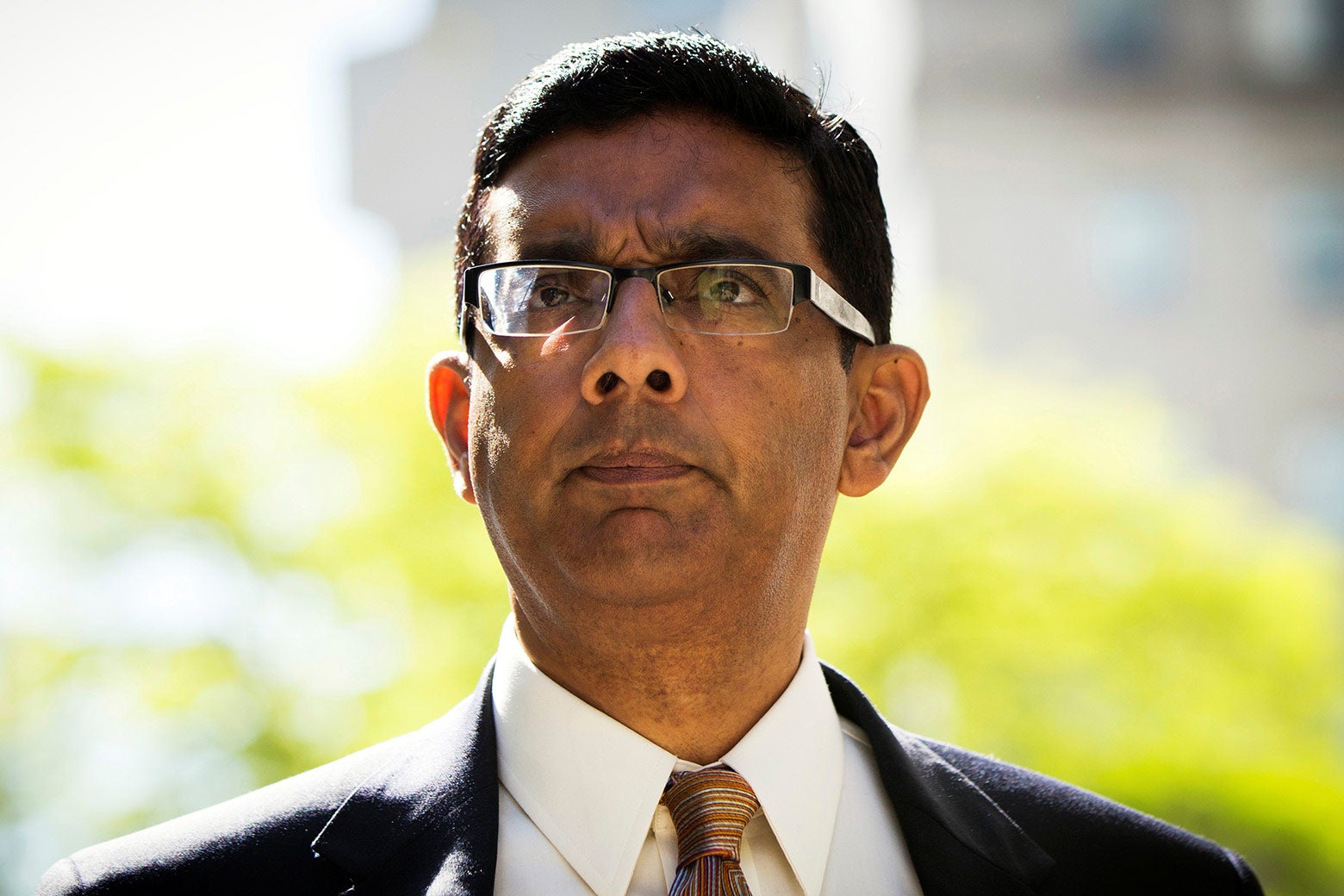President Trump’s recent pardons don’t even pretend to address actual injustice in the criminal justice system. They are borne entirely and transparently out of Trump’s self-interest. The pardon of former Arizona Sheriff Joe Arpaio, convicted of criminal contempt of court, was a reward for a close supporter who shares the president’s hostility to immigration. The pardon of Scooter Libby, convicted of perjury and obstruction of justice, was a reminder to Trump’s associates, who are under investigation by the FBI. And this week’s pardon of Dinesh D’Souza, convicted for a felony violation of campaign finance law, marks both a strike against a political foe—former U.S Attorney Preet Bharara, a vocal Trump critic whose office pursued the case—and a show of solidarity with a figure who built his career on the same prejudice and conspiracy theorizing that fueled Trump’s rise through the Republican Party.
In a healthier political system, D’Souza would be a fringe figure, whose open bigotry and shoddy intellectualism would leave him on the outside looking in. Instead, he is a conservative in good standing with strong ties to the Republican Party elite. While it’s too much to say that D’Souza is responsible for Trump or Trumpism, his presence in the rarefied spaces of Republican politics is a reminder that Trump merely embodies the dysfunctions and pathologies that already existed within the conservative movement.
D’Souza has trafficked in racism and homophobia for nearly 30 years, stretching back to his time at Dartmouth in the early years of the Reagan administration, where he edited the right-wing Dartmouth Review. Among other things, he ran an anti–affirmative action article written in a caricature of black vernacular English (titled “Dis Sho Ain’t No Jive, Bro”) and, along with fellow student (and traveler) Laura Ingraham, outed a number of closeted LGBT students at the university. After graduating, D’Souza worked in the Reagan White House before making his way to the American Enterprise Institute, then and now a respectable home for conservative thought.
Perched at the AEI, D’Souza would spend the 1990s taking aim at liberalism, in general, and liberal anti-racism, in particular. He has whitewashed both slavery (“the American slave was treated like property, which is to say, pretty well”) and Jim Crow (segregation, he wrote, “represented a compromise on the part of the Southern ruling elite seeking, in part, to protect blacks”).
In one of his most popular books, The End of Racism, D’Souza argued against broad remedies of racial discrimination, attributing black disadvantage to cultural deficiency and pervasive criminality: “The main contemporary obstacle facing African Americans … involves destructive and pathological cultural patterns of behavior: excessive reliance on government, conspiratorial paranoia about racism, a resistance to academic achievement as ‘acting white,’ a celebration of the criminal and outlaw as authentically black, and the normalization of illegitimacy and dependency.”
These were mainstream views at the time, expressed in publications like the New Republic and operationalized in the 1996 welfare-reform bill, which made D’Souza a mainstream thinker with high standing as a prominent conservative intellectual. It was only in the late 2000s, as Americans embraced Barack Obama and took tentative steps toward racial liberalism, that D’Souza’s racism took a turn to the conspiratorial. In his books The Roots of Obama’s Rage and Obama’s America: Unmaking the American Dream, D’Souza alleged that the former president was driven by an “inherited rage” that he described as “an anticolonialist rage against Western dominance, and most especially against the wealth and power of the very nation Barack Obama now leads.” D’Souza entertained the birther conspiracy about Obama—while denying that he was a birther himself— and charged that “from a very young age and through his formative years, Obama learned to see America as a force for global domination and destruction.”
Conservative intellectuals rejected D’Souza’s conspiratorial thinking. But he found a home among some prominent Republicans—like former House Speaker Newt Gingrich, who referenced D’Souza during his presidential run—as well as the more feverish swamps of the American right. It was around this time that D’Souza was prosecuted for, and pleaded guilty to, one count of making illegal political contributions in the names of others.
How did D’Souza go from a convicted felon on the fringe of Republican politics to the surprise recipient of a pardon from the president of the United States? The simple answer is that his racist conspiracy mongering eventually found wide purchase among rank-and-file conservatives, who made his documentary 2016: Obama’s America a top-grossing feature and who have turned his books into best-sellers. Indeed, this conspiratorial thinking was urged on by Republican politicians, who routinely framed President Obama as an existential danger to the United States, elevating the most irresponsible voices on the right. Those voices included Donald Trump, whose endorsement Mitt Romney gamely accepted in 2012, even as Trump stoked birther backlash for most of Obama’s presidency.
The groundwork laid by D’Souza for decades finally bore fruit (or went awry, depending on your perspective) in 2016, when Trump rode this conspiracy thinking—fanned further by figures like Alex Jones and publications like Breitbart—to victory in the Republican presidential primary. During that time, D’Souza became a bona fide right-wing celebrity, seen on conservative media, hosted at conservative conferences, and befriended by Republicans politicians like Texas Sen. Ted Cruz, who advocated for his pardon.
Everything D’Souza has stood for over the course of his career—racism, malicious trolling, and conspiracy theorizing—now exists at the center of conservative politics, emanating from the West Wing. He didn’t place it there, but he helped give it shape and form. His story shows the thin wall between the Republican mainstream and the fringe, and how, after decades of pressure from many figures like D’Souza, it has finally collapsed, eliminating any distinctions that matter.
